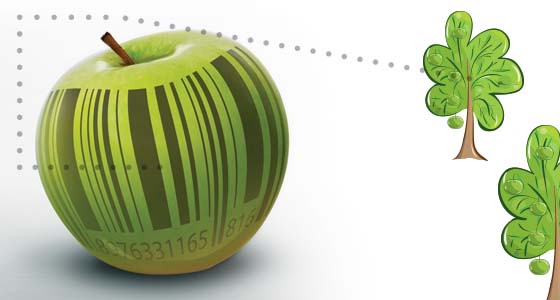A New Tool to Enhance Traceability
IFT launches the Global Food Traceability Center, a landmark initiative created to strengthen food safety measures through enhanced product tracing.

According to the Centers for Disease Control and Prevention, each year 48 million people acquire foodborne illnesses, resulting in 128,000 hospitalizations and 3,000 deaths. Outbreaks of foodborne illnesses cause food companies to incur millions of dollars to recall contaminated food, develop legal and communicative strategies, and address revenue losses. Moreover, the time needed to respond to foodrelated emergencies—which includes multiple rounds of testing, identifying the culprit, and tracing the product to its origin—is unacceptably high. Such time delays result in the increased distribution of contaminated products, more sick consumers, and the evaporation of consumer trust in the food supply. In a groundbreaking effort to address these issues, the Institute of Food Technologists (IFT) has launched a new initiative aimed at enhancing product traceability, thereby improving food safety: The Global Food Traceability Center (GFTC).
The GFTC’s Purpose
Strengthening the food system requires an international scope, increased responsiveness, greater collaboration among stakeholders, and improved understanding of tracing methods. The GFTC represents a crucial channel through which this can be accomplished. It is designed to be an unbiased, authoritative source of science-based information on the best practices and solutions for traceability, circumventing the standard approaches of proprietary interests, narrow focus on specific commodities, and poor collaboration between industry and government. No other single public or private entity brings together key stakeholders in the agriculture and food industries to collaboratively develop effective, timely product-tracing strategies.
The center has plans to serve all aspects of the food system, from farm to consumer, by generating knowledge to fill information gaps and delivering applied research, objective advice, and practical expertise. This will require long-term collaboration among food stakeholders around the world that are interested in providing safer food by building links between food-tracing strategies and food-safety initiatives. This knowledge will serve as the basis for best practices and standards for not only product tracing but also food recalls. To accomplish its mission, the GFTC will rely on the following four business platforms.
• Research. Through its product traceability reports for the U.S. Food and Drug Administration (FDA) and three research summits on traceability, IFT has already made significant advances in the gathering of data on product tracing and food recalls. With this initiative, IFT extends its efforts and seeks cooperative investigating of innovations in traceability. The GFTC will pursue two benchmark projects in this regard: One project will investigate the technologies being used within businesses to trace products, and the other project will identify and assess the technologies being used between businesses. In both cases, the economic values and ramifications of use will be assessed. These projects and others will help position the GFTC as an innovation center that fosters ideas, provides support, and delivers solutions.
• Protocols and standards. Incongruence between company-specific traceability technologies and nation-specific guidelines is a significant hindrance to successful product tracing and is overwhelming the food system. This aspect of the GFTC will serve as a conduit for stakeholders to consider, endorse, and adopt common interoperability standards and protocols across the global food system. An assessment of the regulatory approaches to traceability in the United States, Europe, and Canada will commence this effort. A preliminary objective is to identify dissimilar conditions and requirements imposed by each country and propose policies that reconcile regulatory gaps. The GFTC plans to eventually provide a focal point for the assessment and recommendation of international policies and standards in the food industry.
--- PAGE BREAK ---
 • Education and training. The GFTC is designed to serve as a repository of authoritative information on food traceability. This will be facilitated in part by the creation of a traceability section within IFT’s existing online library of reports. In addition to housing IFT-generated information, this resource will provide access to traceability research from other sources, including policies, technologies, and standards from IFT’s partners in this area. The center has plans to host an international conference on traceability as well as regional seminars and workshops. Training business professionals to teach traceability programs and procedures will also be a priority.
• Education and training. The GFTC is designed to serve as a repository of authoritative information on food traceability. This will be facilitated in part by the creation of a traceability section within IFT’s existing online library of reports. In addition to housing IFT-generated information, this resource will provide access to traceability research from other sources, including policies, technologies, and standards from IFT’s partners in this area. The center has plans to host an international conference on traceability as well as regional seminars and workshops. Training business professionals to teach traceability programs and procedures will also be a priority.
• Technology transfer. This platform involves availing intellectual property on traceability systems and solutions to agriculture and food businesses. This will require nurturing alliances among academia, regulatory policymakers, and industry players. The objective is to create and implement a common, unified approach to traceability technology.
Partnerships
At a September 2013 press event publicizing the GFTC, IFT’s William Fisher, Vice President of Science & Policy Initiatives, described how the center is developing public and private partnerships that will share the costs and benefits of this effort as well as provide expertise. The founding sponsors of the GFTC are Cargill Inc., Eurofins Microbiology Laboratories Inc., FMI Foundation, Global Cold Chain Alliance, GS1 US, International Association for Food Protection, Intertek Group, Lyngsoe Systems, Mars Inc., National Fisheries Institute, PepsiCo, Produce Marketing Association, University of Guelph, and Walmart. To widen the scope of its collaborative approach to achieve traceability greatness, the center will reach out to other entities such as domestic and international small businesses, international food agencies, and food experts around the world. This will ensure access to global ideas, research, and accomplishments in product tracing. “These issues are critical: People’s lives and health are at stake,” says Jack Sinclair, Executive Vice President, Walmart. According to Sinclair, the GFTC will “pave the way” to improving collaboration to identify the origins of food and advance product traceability. The Walmart executive firmly believes that food traceability is important to achieve the company’s goals of providing a safe, sustainable food supply and building and maintaining consumer trust. “This is a great opportunity for us to learn from one another. This is a noncompetitive issue. When one of us falls, all of us fall,” he says.
The GFTC’s vision and purpose also merges well with the mandates and objectives of the Food Safety Modernization Act (FSMA). According to Sherri McGarry, Senior Advisor, FDA, the FDA notes that improving food traceability is a benefit to public health, and harnessing technology to enhance product tracing is key to reducing public health risks. “We need a rapid and interoperable system that will identify issues and respond rapidly, reducing the risks to consumers,” she says. Because 15% of the U.S. food supply is imported from other countries, McGarry says that the GFTC’s global approach is necessary to accommodate a food supply that is becoming more diverse and complex. Section 204 of the FSMA has key requirements for establishing record-keeping requirements for product tracing: pilot projects, a report to Congress, designation of high-risk foods, proposed rule(s), public meetings, final rule(s), and guidance. The FDA considers the GFTC a venue for dialogue on covering multiple levels of the food supply chain from farmers to consumers, and it will rely on the center to provide data the agency can utilize in creating proposed rules. “We expect to work with the GFTC as we move forward to implement [the] FSMA and the rulemaking process,” McGarry says.
Caroline Smith DeWaal, Director, Food Safety, Center for Science in the Public Interest, agrees: “I’d really like to see the center communicate openly with the FDA and help fill information gaps.” Recalling the spinach foodborne illness outbreak in 2006, she explains that “every [food] outbreak tells a story and is a teachable moment.” The consumption level of spinach has yet to recover fully to pre-outbreak levels. Consequently, outbreaks harm not only the industry; they also harm consumer confidence in implicated foods and the food system in general, discouraging consumption of healthy foods in some instances. DeWaal refers to an opinion poll taken before the passing of the FSMA; the poll indicated that 90% of consumers supported mandatory recalls and believed product traceability would benefit them. “We really need a system that will help the FDA and the CDC improve product traceability.”
Timeline
Fisher says that activities are already underway to achieve the GFTC’s objectives, and he encourages professionals with expertise in food safety, product traceability, and food recalls to partner with IFT in the development and implementation of practical traceability solutions across the global food system. For more information on the GFTC, visit www.globalfoodtraceability.org. A video of the September 2013 press event announcing the GFTC is available at http://www.ift.org/GFTC/The-Center-Events/Launch-Event-Video.aspx.
Toni Tarver
is Senior Writer/Editor for Food Technology magazine
([email protected]).
